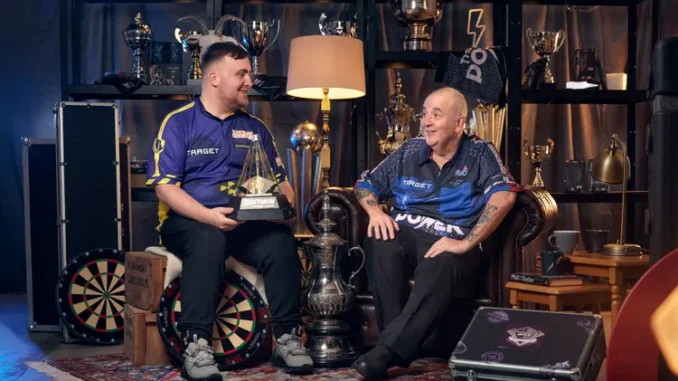
In the electrifying world of professional darts, one name has set the sport ablaze: Luke Littler. At just 18, the Warrington wonderkid has transformed the PDC circuit, amassing titles and shattering records with a fearless flair that’s drawn comparisons to legends. Since his stunning run to the 2024 PDC World Championship final at 16, Littler has claimed the World Championship, Premier League, World Matchplay, and two European Tour titles, including the Belgian Darts Open, cementing his status as the youngest ever to achieve the sport’s coveted Triple Crown. With a trophy cabinet bursting and averages routinely soaring past 100, Littler, nicknamed “The Nuke,” seems unstoppable. But darts icon Phil Taylor, the 16-time world champion, has offered a rare glimpse into a strategy that might derail the teenager’s relentless charge: slow the game down.
Speaking to the MODUS Super Series, Taylor, widely regarded as the greatest darter of all time, shared his insight into combating Littler’s meteoric rise. “Yeah, a lot of that [throwing the darts quickly] comes because youngsters practise on their own. So, they don’t have that person slowing them down,” Taylor explained. “I used to try and practise with somebody if I could to keep me in that rhythm of playing. So, that is why a lot when a player plays a younger player [like Littler], they start slowing them down to put them off because they are not used to it.” The 64-year-old, whose 23-year reign included eight consecutive world titles, believes this psychological tactic could disrupt Littler’s rapid-fire rhythm. “Anyone who plays Luke Littler will slow their throw down,” he added, suggesting that veterans might deliberately pause at the oche or linger when retrieving darts to throw Littler off his natural pace.
Littler’s dominance in 2025 has been staggering. His 7-3 demolition of Michael van Gerwen in the World Championship final at Alexandra Palace, followed by wins in the UK Open and Grand Slam of Darts, showcases his blend of power scoring and ice-cold finishing. His nine-darter in Bahrain and a 108 average against Gerwyn Price in New Zealand highlight a player thriving under pressure. Yet, Taylor’s strategy taps into a subtle vulnerability: Littler’s preference for a brisk tempo, honed through solo practice sessions. By contrast, Taylor’s era was defined by his ability to control the game’s pace, using his darting IQ to unsettle opponents. “Levels with Littler need to slow down the game,” Taylor emphasized, a nod to the mental chess match that defined his own battles against the likes of Raymond van Barneveld and Dennis Priestley.
The Flanders Darts Trophy, kicking off on August 29, 2025, at Antwerp’s Xpo, is Littler’s next stage. As the second seed, he faces Dylan Slevin or Francois Schweyen in the second round on Saturday, fresh off emergency dental surgery that left him “in shock and shaken.” Despite the setback, Littler remains the favorite, with his £2.2 million in career prize money and a knack for silencing hostile crowds. “I just felt untouchable tonight,” he said after a recent 115-average masterclass, a sentiment that underscores his confidence. However, opponents like Stephen Bunting, averaging 101.7 at Players Championship 24, or Martin Schindler, with three European Tour titles this year, could test Taylor’s theory by slowing the pace to disrupt Littler’s flow.
The tactic, while intriguing, has yet to prove effective. Littler’s adaptability is remarkable—where early career pressure once rattled him, he now revels in the spotlight. Even seasoned tacticians like Peter Wright and James Wade have struggled to counter his relentless scoring and clutch doubles. “The thing is, he’s retired. He played in the Seniors and he can’t even win in the Seniors,” Bobby George quipped about Taylor, suggesting Littler’s modern game might overpower even prime Taylor. Yet, Taylor’s advice carries weight, drawn from a career where he outsmarted opponents with both skill and psychology. “Youngsters now are fearless, almost disrespectful,” Taylor noted, marveling at Littler’s audacity. “They don’t give tuppence who you are or what you’ve done—they are not frightened of anyone.”
As Littler eyes the £30,000 prize in Antwerp, the darts world watches closely. Can veterans like van Gerwen or Price, who’s beaten Littler six times consecutively, employ Taylor’s slow-play strategy to dethrone the prodigy? Or will Littler’s raw talent and adaptability render such tactics obsolete? With the tournament streamed on DAZN and PDCTV, and a field including Chisnall, Bunting, and Schindler, the stage is set for a thrilling test. For now, Littler’s darts fly fast and true, but Taylor’s wisdom reminds us: in darts, sometimes the sharpest weapon is time itself.
Leave a Reply